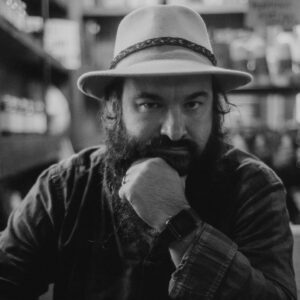Currently, Graeme Bachiu is documentary filmmaker through his company Windecker Road Films. He produces broadcast and branded documentaries as well as picks up some work from other producers on a work-for-hire basis.
His recent documentary series, Canfield Roots, began to air in early 2022.
Career path
Prior to 2015, I had a career in broadcast news with CHCH TV. Prior to that, I had a long history with Rogers in community television where I did everything from producing and directing, master control to even building mobile trucks.
I was privileged to work with some of Canada’s finest journalists in my news career and one thing that set them all apart for me was their ability to tell compelling stories. News, at the time when I got into it, was still a great balance of longer-form feature stories and daily news bootcamp. Among the people who were gracious enough to pass on their knowledge were people like Connie Smith, Fred Anderton and Scot Urquhart.
When I considered a move into making documentaries full time I was encouraged by people like Peter Murray, Jell Boulton and, my friend, Carole Aeschelmann.
Recently, through my membership with the Documentary Organization of Canada, I’ve been able to lean on the knowledge of many prominent Canadian filmmakers, which has been wonderful. I approach my craft thinking there’s always more to learn and being open to that search for knowledge will serve you more than anything else in this business.
I also look at all of my projects from an editorial perspective—that is, I was an editor long before I was anything else and I will always love editing—so one of my biggest influences was my late friend Bob Horton who was an editor at CHCH TV. Everyone needs an editor on their side.
Standout NC experience
Technologically speaking, I was in college ‘when dinosaurs roamed the earth’—analog video! Back then when you were going into TV and film, you were entering a world governed by a techno-priesthood of well-compensated specialists and you had to play by a set of rules that reinforced that privileged access to knowledge and equipment. This was midway through the switch to digital formats…no YouTube or iPhones yet. (I started in 1998.)
It’s a bit quaint to say this now but I learned a lot of fundamental knowledge in the technical side of television that is still applicable today. That served me in good stead throughout my news career and gave me a basis to build on as I developed other skills. I wish now that more of the business end of television had been explained way back when, but I also realize that things change so quickly that the information would be out of date before it gets delivered.
I’m a weirdo, I like to soak up information and experiences from other people. In my first year I met Bill Boehlen who encouraged me to multitrack audio suites or AB roll edit suites late at night to experiment and learn on my own, something that may not have been totally kosher with the coordinators, I don’t know.
Brian Green really opened my eyes to the world of journalism and current events and primed the pump in my interest of the world around me. And I loved hanging out drinking coffee with Bruce Ashford and Byron Gracey and talking technology—and Star Trek.
The late Greg Darling, despite being a hoity-toity film prof, was always willing to impart his wisdom as well on how to approach projects…usually I had to stand out with the smokers at the doors to the Voyager wing and suck in secondhand smoke to get the really good tidbits of info. Aside from that, I spent a lot of time in edit suites and stepping in to help my classmates nail their projects.
I wasn’t much of a joiner…didn’t play any sports or anything…would shoot all day long and then hit the AVID at night for a few hours and work on one of my many extra projects. I’m trying to remember how many corporate documentary projects I worked on in my third year (it was a few). I really enjoyed working on those as part of a small crew and that’s the model I still operate with now.
Words of wisdom
My advice to people just starting out in documentary is that you’ve got to want it and want it bad.
Do you like going on vacations? Do you like driving a nice car and having lots of discretionary income? If you do, you should probably go work for a bank or be an accountant.
If you’re not prepared to suborn your entire life to the service of bringing real stories to life on screen, you should not get into making documentaries. There is no work-life balance to be had for an independent documentary producer. No such thing. Put it out of your mind.
And get to work on something—anything, really. It doesn’t matter how stupid or ill-conceived…all of us today have the power and accessibility of technology that didn’t exist a decade ago and if you have a vision, you have no reason not to carry it out in some way. Certainly, no technological barrier exists.
Seek out people who know more than you do and trick them into revealing their secrets to you.
Always be working and always be telling people about the work you’re doing.
Don’t work for free, but don’t turn down free work, either.
College helped me see the larger picture of what’s possible in the film and television industry and provided, at the time, access to equipment and expertise that I didn’t have at the time. I was encouraged by profs to try new things and always be learning and I’ve carried that over into my professional life.



